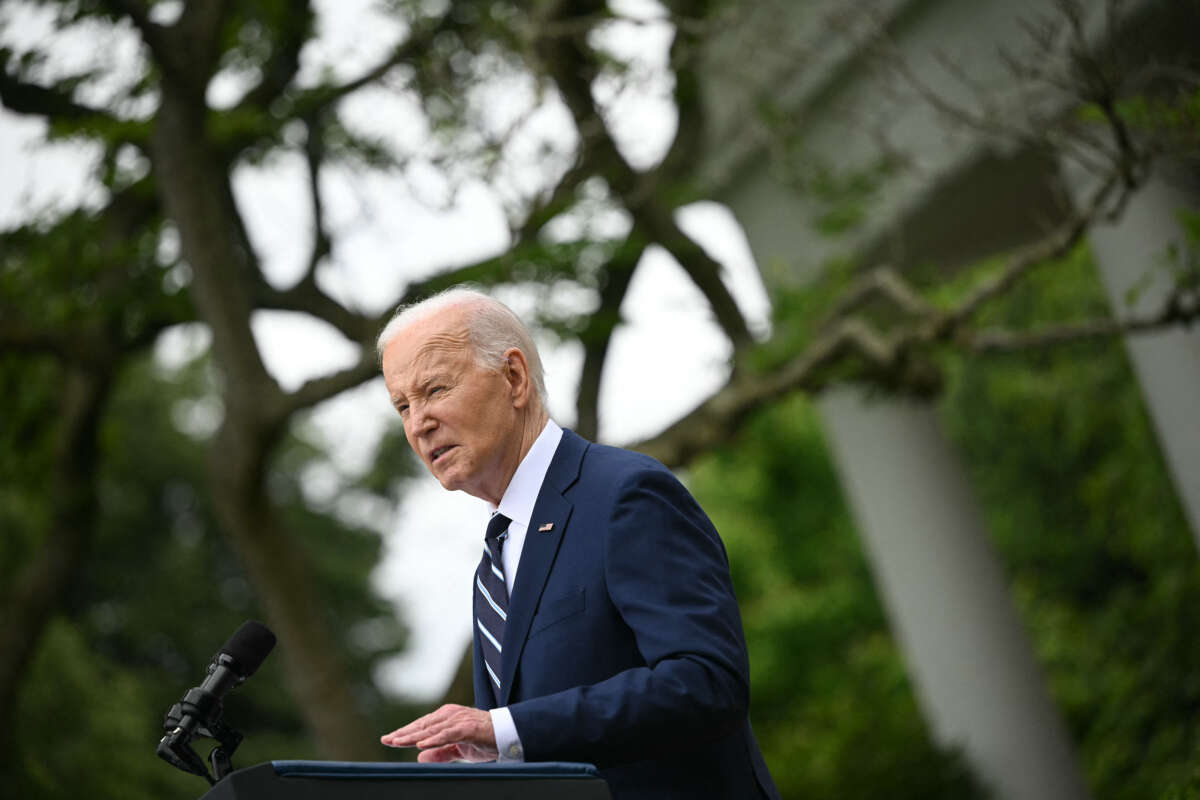Support justice-driven, accurate and transparent news — make a quick donation to Truthout today!
As Israel initiates what many fear could be the worst phase of the genocide in Gaza yet, the Biden administration has reportedly begun the process of sending over $1.2 billion of weapons despite public proclamations from the Biden administration opposing an invasion of Rafah.
The Wall Street Journal and multiple other outlets reported that congressional sources say the administration has notified Congress that it is pursuing the deal. It would reportedly include the transfer of $700 million of tank ammunition, $500 million in tactical vehicles and $60 million in mortar rounds — all ground-based military equipment that could help arm the tanks that are pushing into Rafah now or transport troops deeper into Gaza.
The deal shows that the Biden administration does not want to upset Israeli donors who had criticized officials for pausing a shipment of bombs, as The Washington Post noted. It also undermines the public criticisms of Israel by the U.S. administration, which continues to work on more arms deals as Israel’s military prepares to decimate Rafah.
News of the deal comes as an Israeli ground invasion of Rafah looms. Biden administration officials have assessed that enough Israeli troops have amassed at the border of Rafah to launch a full-scale invasion in the coming days, CNN reported on Monday. U.S. officials have warned against such an incursion, but they have declined to do anything to discourage it — and in fact they seem to be encouraging it with a new deal that could directly supply arms for such an attack.
Just last week, President Joe Biden vowed to withhold some transfers of 2,000-pound bombs to Israel if it invades Rafah because Israeli forces have been using these weapons to kill droves of civilians in Gaza. The administration also paused a shipment of thousands of munitions, including 2,000-pound bombs and 500-pound bombs, and said it was supposedly reviewing the shipments of JDAMs, which convert unguided bombs into precision-guided ones.
At the time of Biden’s pledge — which represents the only condition he has set on weapons deals with Israel after seven months of genocide — Israeli forces had already begun a raid of Rafah and taken over the border crossing, which is where most humanitarian aid had been entering Gaza since October. In the past 24 hours alone, at least 82 Palestinians have been killed as Israel has bombed Rafah and the Jabalia refugee camp in the north, while depriving the entire region of all forms of humanitarian aid.
The Biden administration has been perhaps purposefully vague and self-contradictory about what would trigger conditions on military assistance for Israel. Just in March, Biden said that an Israeli military incursion in Rafah would cross a “red line” for the administration, after previously having expressed concerns about a Rafah invasion.
But then, last week, the Biden administration said that Israel hadn’t crossed its red line yet despite having begun its invasion. Instead, officials and reports said that the red line was actually if Israel pursued a “major” invasion — something never specified in previous statements.
Israeli officials, on the other hand, have been exceedingly clear about their goals for Rafah and beyond. Earlier this month, Israeli Finance Minister and member of the powerful Israeli security cabinet Bezalel Smotrich vowed “total annihilation” of Rafah as well as the central neighborhoods of Deir al-Balah and Nuseirat refugee camp, the former of which is part of the designated “humanitarian zone” where Palestinians have been ordered to flee. Meanwhile, fellow security cabinet member and Israeli National Security Minister Itamar Ben-Gvir said that Israel’s ultimate goal must be for Israelis to settle Gaza.
A terrifying moment. We appeal for your support.
In the last weeks, we have witnessed an authoritarian assault on communities in Minnesota and across the nation.
The need for truthful, grassroots reporting is urgent at this cataclysmic historical moment. Yet, Trump-aligned billionaires and other allies have taken over many legacy media outlets — the culmination of a decades-long campaign to place control of the narrative into the hands of the political right.
We refuse to let Trump’s blatant propaganda machine go unchecked. Untethered to corporate ownership or advertisers, Truthout remains fearless in our reporting and our determination to use journalism as a tool for justice.
But we need your help just to fund our basic expenses. Over 80 percent of Truthout’s funding comes from small individual donations from our community of readers, and over a third of our total budget is supported by recurring monthly donors.
Truthout has launched a fundraiser, and we have a goal to add 273 new monthly donors in the next 72 hours. Whether you can make a small monthly donation or a larger one-time gift, Truthout only works with your support.
